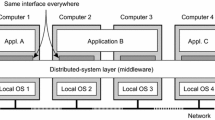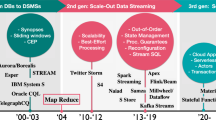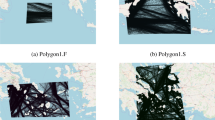Abstract
In mobile database systems, mobility of users has a significant impact on data replication. As a result, the various replica control protocols that exist today in traditional distributed and multidatabase environments are no longer suitable. To solve this problem, a new mobile database replication scheme, the Transaction-Level Result-Set Propagation (TLRSP) model, is put forward in this paper. The conflict detection and resolution strategy based on TLRSP is discussed in detail, and the implementation algorithm is proposed. In order to compare the performance of the TLRSP model with that of other mobile replication schemes, we have developed a detailed simulation model. Experimental results show that the TLRSP model provides an efficient support for replicated mobile database systems by reducing reprocessing overhead and maintaining database consistency.
Similar content being viewed by others
References
Walborn G D, Chrysanthis P K. Supporting semantics-based transaction processing in mobile database applications. InProceedings of the 14th Symposium on Reliable Distributed Systems, Bad Neuenahr, Germany, Sept., 1995, pp. 31–40.
Coulouris G, Dollimore J, Kindberg T. Distributed Systems: Concepts and Design. UK: Addison-Wesley, 1996.
Gray J, Helland P, O’Neil P E, Shasha D. The dangers of replication and a solution. InProceedings of the 1996 ACM SIGMOD International Conference on Management of Data, Montreal, Canada, June, 1996, pp. 173–182.
Byun S, Moon S. Resilient data management for replicated mobile database systems.Data & Knowledge Engineering, 1999, 29(1): 43–55.
Wu S, Chang Y. An active replication scheme for mobile data management. InProceedings of the 6th International Conference on Database Systems for Advanced Applications, Hsinchu, Taiwan, April, 1999, pp. 143–150.
He X G, Tang C J, Li L, Liu Y S. Special Database Technologies. Beijing: Science Press, 2000.
Demers A, Petersen K, Spreitzer Met al. The bayou architecture: Support for data sharing among mobile users. InProceedings of the IEEE-Workshop on Mobile Computing Systems and Applications, Santa Cruz, CA, USA, Dec., 1994, pp. 2–7.
Phatak S H, Badrinath B R. Multiversion reconciliation for mobile databases. InProceedings of the 15th International Conference on Data Engineering, Sydney, Australia, Mar., 1999, pp. 582–589.
Ku K, Kim Y S. Moflex transaction model for mobile heterogeneous multidatabase systems. InProceedings of the 10th International Workshop on Research Issues in Data Engineering, San Diego, California, Feb., 2000, pp. 39–45.
Kung H T, Robinson J T. On optimistic methods of concurrency control.ACM Transactions on Database System, 1981, 6(2): 213–226.
Goldring R. Things every update replication customer should know. InProceedings of the 1995 ACM SIGMOD International Conference on Management of Data, San Jose, CA, USA, May, 1995, pp. 439–440.
Author information
Authors and Affiliations
Corresponding author
Additional information
This research is supported by the National “863” High-Tech Programme of China under Grant No. 863-306-ZD12-12-1 and the National Natural Science Foundation of China under Grant No. 60073014.
DING Zhiming received his B.S. degree from Wuhan University in 1989 and his M.S. degree from Beijing Polytechnic University in 1996. He is now a Ph.D. candidate of the Institute of Computing Technology, the Chinese Academy of Sciences. His current research interests include database systems, mobile computing, and information retrieval.
MENG Xiaofeng received his M.S. degree from the Renmin University of China in 1993 and his Ph.D. degree from the Institute of Computing Technology, the Chinese Academy of Sciences in 1999. He is now a professor of the Information School, Renmin University of China. His current research interests include database systems, Web data management, and mobile computing.
Wang Shan received her B.S. degree from Beijing University in 1968 and her M.S. degree from the Renmin University of China in 1981. She is now the dean and a professor of the Information School, Renmin University of China. She is also a research fellow and a Ph.D. supervisor of the Institute of Computing Technology, the Chinese Academy of Sciences. Her research interests include database systems and knowledge engineering, mobile data management, and data warehousing.
Rights and permissions
About this article
Cite this article
Ding, Z., Meng, X. & Wang, S. A transactional asynchronous replication scheme for mobile database systems. J. Comput. Sci. & Technol. 17, 389–396 (2002). https://doi.org/10.1007/BF02943279
Received:
Revised:
Issue Date:
DOI: https://doi.org/10.1007/BF02943279




